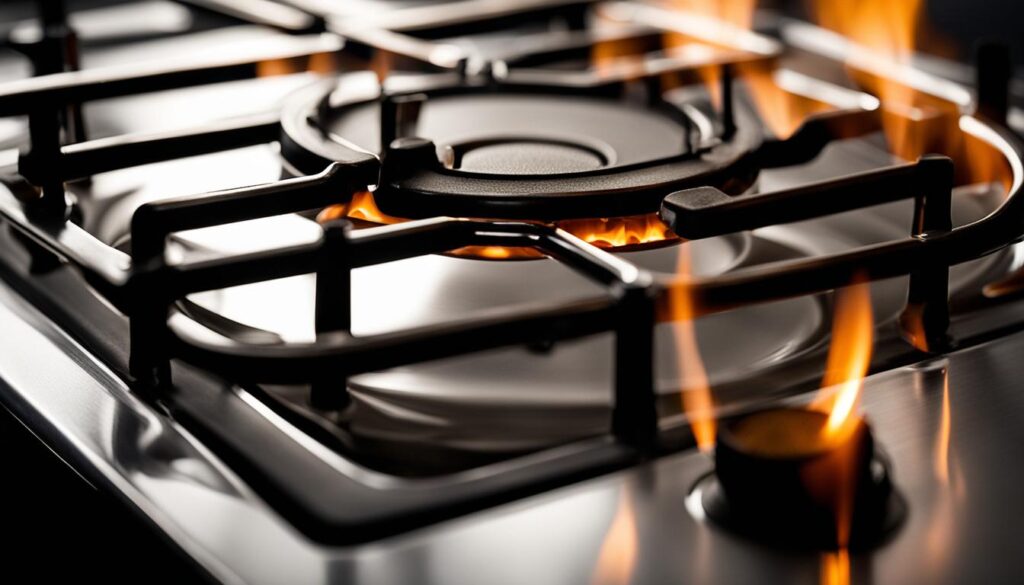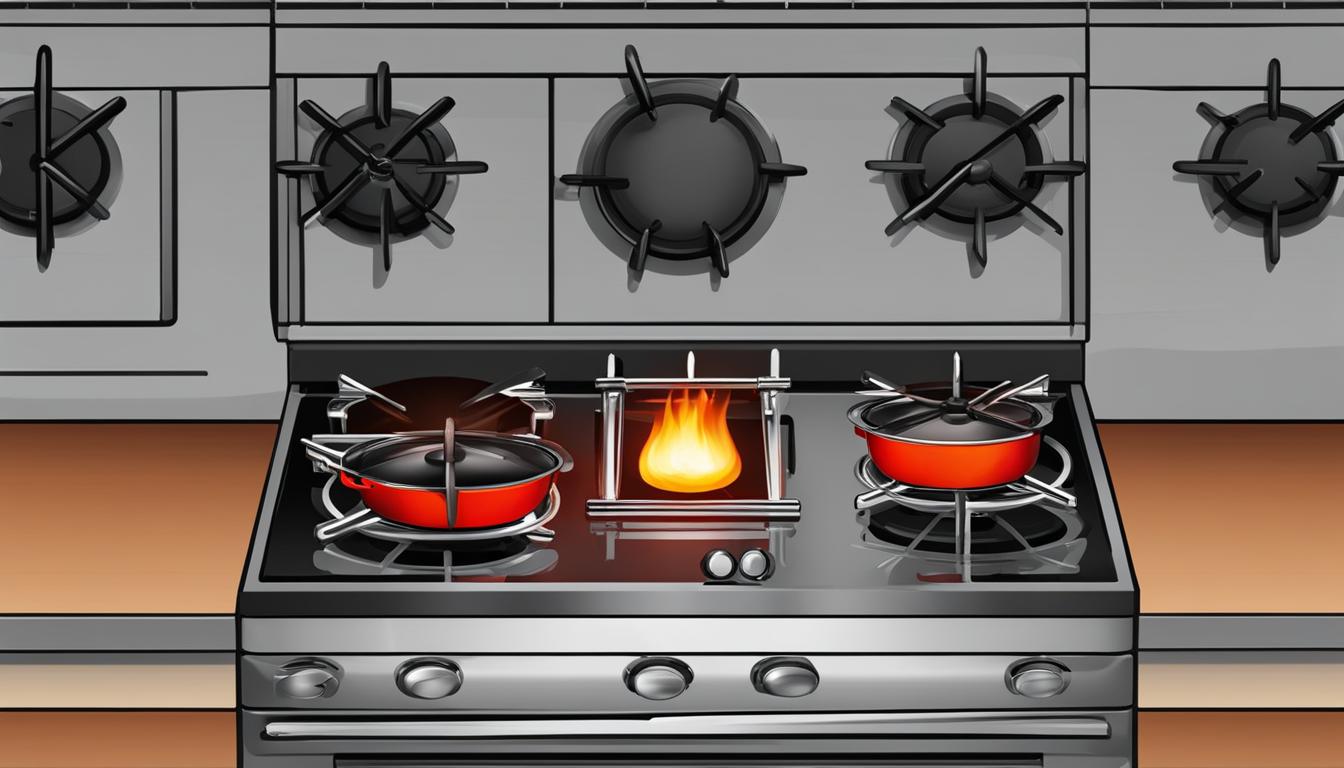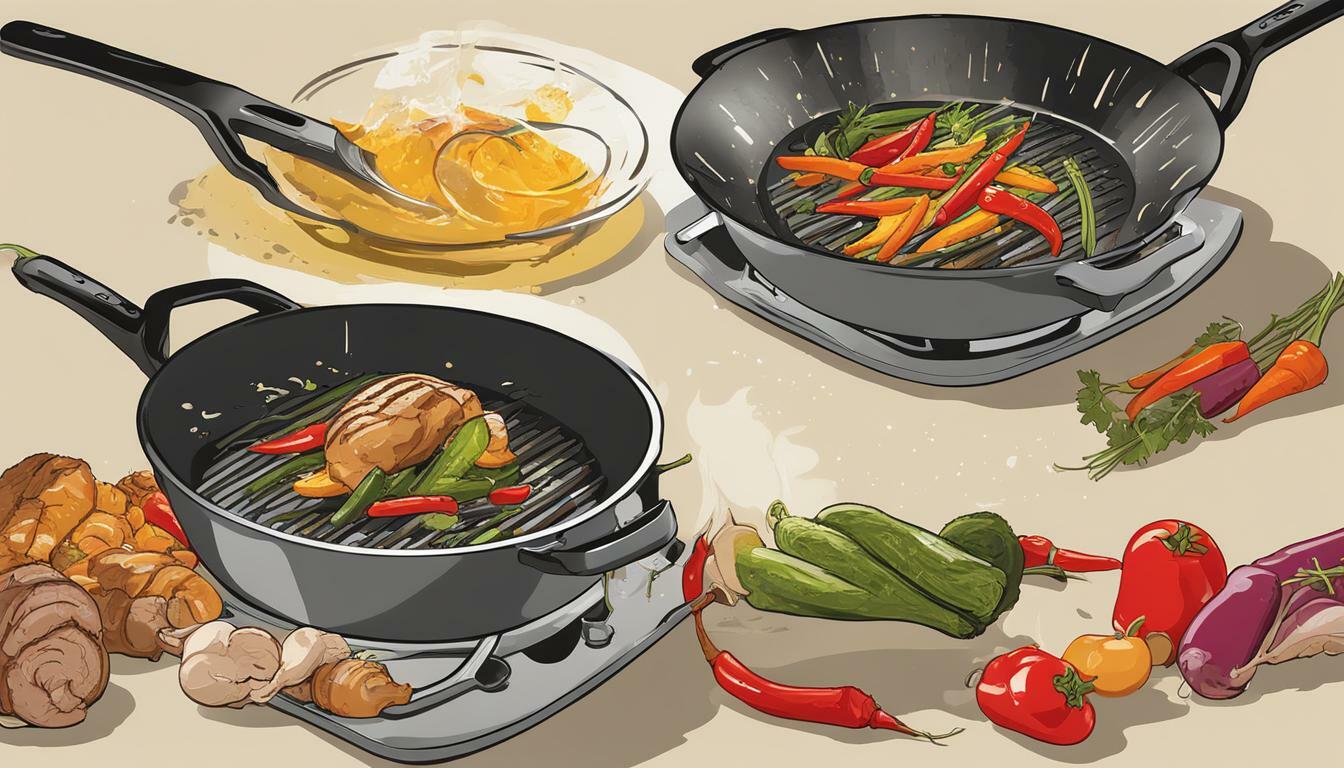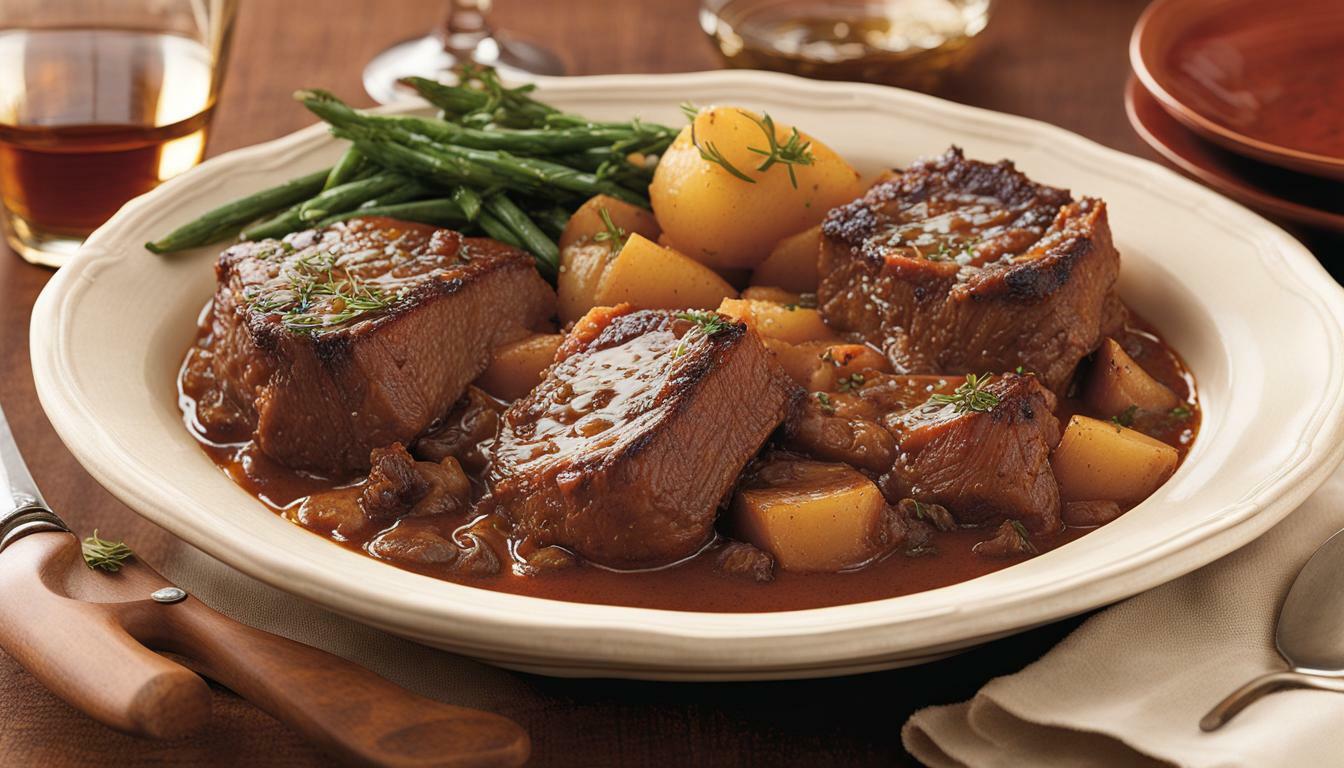Gas ranges and electric ranges have unique characteristics and features that make them suitable for different cooking needs. Gas stoves utilize an open flame for cooking, allowing for quick heat adjustment and versatile cooking techniques such as charring and grilling. On the other hand, electric stoves rely on metal heating elements and offer even, dry heat that is optimal for baking and roasting. Both types of stoves have their advantages and disadvantages, which we’ll explore further in this article.
Key Takeaways:
- Gas stoves use an open flame for cooking, allowing for quick heat adjustment and versatile cooking techniques like charring and grilling.
- Electric stoves rely on metal heating elements and offer even, dry heat that is ideal for baking and roasting.
- Gas stoves have the advantage of quick burner cooldown and faster oven preheating, while electric stoves offer responsive and precise oven heat control.
- Gas stoves require a dedicated gas line for installation, while electric stoves require a 240-volt outlet.
- Electric stoves often provide a smooth stovetop surface that is easy to clean, while gas stoves offer stovetop space and versatility.
What is a Gas Range?
A gas range is a versatile cooking appliance that utilizes an open flame for cooking purposes. It consists of a stovetop equipped with gas burners and an oven that also utilizes the same flame for cooking. The gas burners on the stovetop offer different heat levels, allowing for precise control over the flame size. This enables various cooking techniques such as melting, simmering, and frying. The oven in a gas range maintains the desired cooking temperatures by cycling the flame on and off.
To install a gas range, a dedicated gas line is required. This ensures a steady supply of gas to the range for efficient and safe operation. Gas ranges are popular among home cooks and chefs due to their responsive heat control, expanded cooking techniques, and other unique benefits.
Gas Range Features:
- Open flame cooking: The open flame of a gas range allows for quick heat adjustment and precise cooking techniques.
- Heat levels: The gas burners on the stovetop offer different heat levels, providing versatility in cooking.
- Flame size: The ability to control the flame size allows for various cooking techniques.
- Oven functionality: The oven in a gas range utilizes the same flame for cooking, ensuring consistent and even heat distribution.
| Gas Range | Features |
|---|---|
| Stovetop | Gas burners with different heat levels |
| Oven | Utilizes the same flame for cooking, ensuring consistent heat distribution |
| Installation | Requires a dedicated gas line |
Benefits of a Gas Range
Gas ranges offer numerous benefits that make them a popular choice for both professional chefs and home cooks. These benefits include:
- Responsive Stovetop Heat: One of the main advantages of a gas range is its ability to provide instant heat adjustment. The open flame allows for quick response if a dish is cooking too fast or too slow, giving you precise control over the cooking temperature.
- Expanded Cooking Techniques: Gas ranges offer versatile cooking techniques that can’t be replicated by electric ranges. The open flame allows for charring and grilling directly on the stovetop, giving you the ability to create deliciously charred steaks or perfectly grilled vegetables.
- Quick Burner Cooldown: Once you turn off a gas burner, it cools down quickly. This is particularly useful when you need to make immediate adjustments during cooking or when you’re done cooking and want to ensure safety by preventing accidental burns.
- Fast Oven Preheating: Gas ovens preheat faster compared to electric ranges. This saves you time in the kitchen, allowing you to start cooking your favorite dishes sooner.
These benefits make gas ranges an excellent choice for those who value precision, versatility, and efficiency in their cooking.

Gas Range Benefits
Gas range benefits:
| Benefit | Description |
|---|---|
| Responsive Stovetop Heat | Quick and precise heat adjustment for optimal cooking control. |
| Expanded Cooking Techniques | Versatile cooking options like charring and grilling on the stovetop. |
| Quick Burner Cooldown | Safe and fast cooldown after cooking, reducing the risk of burns. |
| Fast Oven Preheating | Time-saving preheating for faster cooking preparation. |
These benefits highlight the practical advantages of choosing a gas range for your kitchen. Whether you’re a professional chef or a passionate home cook, a gas range can elevate your culinary experience.
What is an Electric Range?
An electric range is a cooking appliance that utilizes heating elements for cooking purposes. Unlike gas ranges that rely on an open flame, electric ranges feature metal heating elements that evenly distribute heat for consistent cooking results. The stovetop of an electric range is typically made of a smooth ceramic-glass surface or exposed metal coils.
Electric ranges require a 240-volt outlet for installation, which is different from the standard 110-volt outlets found in other rooms of the house. This higher voltage allows for the efficient operation of the heating elements and ensures optimal performance. It’s important to note that if you’re considering switching from a gas range to an electric range, you may need to have an electrician install the appropriate outlet.
With the heating elements in both the stovetop and oven, electric ranges provide consistent and even heat throughout the cooking process. This is particularly beneficial for baking and roasting, as the dry heat produced by electric ranges helps to achieve perfectly browned and evenly cooked results. Additionally, electric ranges often offer versatile cooking options with multi-ring elements and a smooth stovetop surface that is easy to clean.
| Advantages of an Electric Range | Disadvantages of an Electric Range |
|---|---|
|
|
Electric Range Features:
- Heating elements for consistent and even heat distribution
- Smooth ceramic-glass or exposed metal coil stovetop surface
- Multi-ring elements for versatile cooking options
- 240-volt outlet required for installation
- Easier stovetop cleaning compared to gas ranges
Benefits of an Electric Range
Electric ranges offer numerous benefits that make them a popular choice among home cooks. One of the key advantages is the responsive and precise heat control provided by the electric oven. This allows for quick temperature adjustments, ensuring your dishes are cooked to perfection. Additionally, the even heat distribution within the oven cavity ensures consistent and reliable cooking results every time.
Another benefit of electric ranges is the dry heat they produce in the oven. This is particularly advantageous when baking bread, roasting chicken, or cooking vegetables. The dry heat promotes browning and crisping, resulting in deliciously golden and flavorful dishes. Whether you’re a baking enthusiast or a fan of perfectly roasted meats, an electric range can deliver the results you desire.
When it comes to the stovetop, electric ranges often offer ample space and versatility. With multi-ring elements, you can adjust the size of the heating area to accommodate different pot and pan sizes. This flexibility allows for efficient and optimized cooking. Moreover, the smooth surface of electric ranges is easy to clean, making post-cooking cleanup a breeze.
In conclusion, the benefits of an electric range are evident. From the responsive and precise oven heat to the dry heat for browning and the versatility and cleanability of the stovetop, an electric range provides an excellent cooking experience for home cooks of all skill levels.
FAQ
What are the main differences between gas and electric stoves?
Gas stoves utilize an open flame for cooking, allowing for quick heat adjustment and versatile cooking techniques such as charring and grilling. Electric stoves rely on metal heating elements and offer even, dry heat that is optimal for baking and roasting.
How does a gas range work?
A gas range utilizes an open flame both on the stovetop and inside the oven. Gas burners on the stovetop offer different heat levels for precise control. The flame cycles on and off in the oven to maintain desired cooking temperatures.
What are the benefits of a gas range?
Gas ranges provide instant heat adjustment, allowing for quick response during cooking. They also offer the flexibility to perform cooking techniques such as charring and grilling directly on the stovetop. Gas burners cool down quickly and gas ovens preheat faster compared to electric ranges.
How does an electric range work?
An electric range relies on metal heating elements for cooking. Electric stovetops feature a smooth, flat surface made of ceramic-glass or exposed metal coils. The heating elements in both the stovetop and oven provide even heat distribution for consistent cooking results.
What are the benefits of an electric range?
Electric ranges offer responsive and precise heat control, allowing for faster temperature adjustments and efficient heat distribution within the oven. Electric heat tends to be drier than gas, resulting in nicely browned results in dishes such as bread, chicken, or vegetables. Electric stovetops often offer versatile cooking options and are easy to clean.
 Skip to main content
Skip to main content


